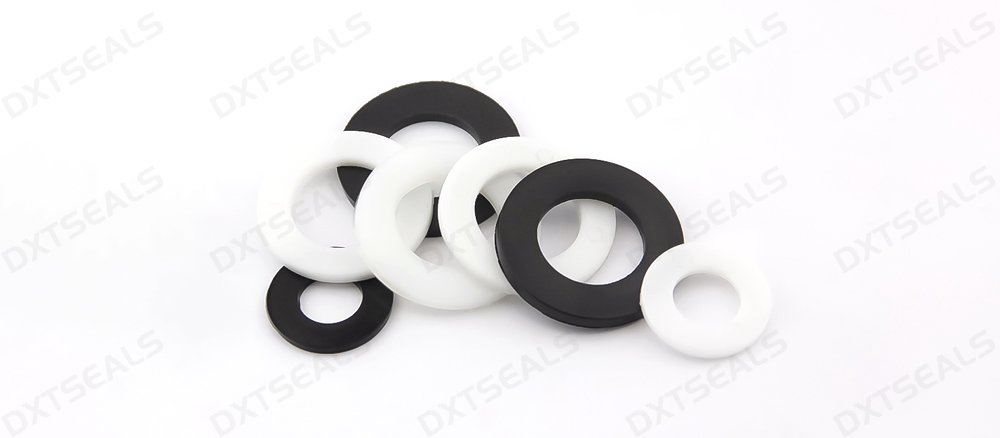
Rubber gaskets are essential components in a vast range of industries, providing reliable sealing solutions that prevent leaks, withstand environmental factors, and maintain system integrity. Used in applications from automotive engines to industrial machinery, rubber gaskets offer versatility, resilience, and durability. This guide explores the advantages of rubber gaskets, the different types available, and their common applications, helping you understand why they are a preferred choice for sealing needs in critical environments.
1. What Are Rubber Gaskets?
Rubber gaskets are precisely cut or molded components made from various types of rubber materials. They create a tight seal between two surfaces, preventing leaks of gases or liquids, absorbing vibrations, and offering protection from dust and contaminants. Rubber’s elasticity and resistance to various environmental factors make it a widely used gasket material.
2. Key Benefits of Rubber Gaskets
Rubber gaskets are known for their durability and adaptability across a wide array of applications. Here are some of the main benefits:
- Sealing Efficiency: Rubber gaskets provide a highly effective seal that prevents the escape or entry of fluids, gases, and contaminants. This makes them essential in systems where maintaining pressure and avoiding leaks is critical.
- Flexibility and Compression: Due to their flexible nature, rubber gaskets can conform to irregular surfaces, filling gaps for a consistent seal even under pressure. This flexibility also allows them to absorb vibrations and reduce noise.
- Chemical and Temperature Resistance: Many rubber materials, such as EPDM, NBR, and silicone, offer resistance to chemicals and varying temperatures, making them suitable for demanding environments like chemical processing and automotive systems.
- Long Service Life: Rubber gaskets can endure heavy-duty applications without deforming or deteriorating quickly, providing a cost-effective solution with minimal maintenance requirements.
- Wide Material Variety: With options like neoprene, nitrile, silicone, and Viton, rubber gaskets can be tailored to meet specific application requirements, including exposure to oils, chemicals, and extreme temperatures.
3. Types of Rubber Gaskets
Rubber gaskets come in various forms, each suited to different applications:
- Neoprene Gaskets: Known for their oil and water resistance, neoprene gaskets are commonly used in automotive and HVAC systems, providing reliable sealing under moderate conditions.
- Nitrile (NBR) Gaskets: Nitrile is resistant to oils and fuels, making it ideal for automotive, marine, and oil & gas applications. Its durability and resistance to abrasion add to its popularity.
- EPDM Gaskets: EPDM offers excellent resistance to weather, UV, and ozone, making it ideal for outdoor applications. It’s often used in HVAC, water systems, and appliances.
- Silicone Gaskets: Silicone provides excellent temperature resistance, ranging from -60°C to over 200°C, and is also food-safe, making it suitable for applications in food processing, medical devices, and electronics.
- Viton Gaskets: Known for their high-temperature resistance and chemical stability, Viton gaskets are widely used in chemical processing and fuel systems.
4. Applications of Rubber Gaskets
Rubber gaskets are integral to various industries due to their versatility and adaptability. Here are some key application areas:
- Automotive Industry: In vehicles, rubber gaskets are used in engines, transmissions, fuel systems, and exhaust systems to prevent fluid leaks and ensure optimal performance. Common applications include valve covers, oil pans, and fuel pumps.
- Aerospace Industry: Aerospace equipment requires reliable sealing solutions that can withstand extreme temperatures and pressures. Rubber gaskets in aerospace applications often include door seals, hydraulic systems, and fuel tanks.
- Industrial Equipment: Rubber gaskets are essential in heavy machinery, compressors, and pumps, providing a leak-proof seal that ensures safe and efficient operation. They are used in equipment subjected to high pressure and varying temperatures.
- Chemical Processing: Rubber gaskets made of Viton or EPDM are frequently used in the chemical industry due to their resistance to harsh chemicals, acids, and solvents. They are commonly found in pipelines, valves, and containment systems.
- Food and Pharmaceutical Industries: Silicone and food-grade rubber gaskets are used in food processing and pharmaceutical equipment, providing a safe and sanitary seal. These gaskets meet regulatory standards and withstand the cleaning processes required in these industries.
5. Factors to Consider When Selecting a Rubber Gasket
Choosing the right rubber gasket for an application requires consideration of several factors:
- Temperature Range: The operating temperature of the application should match the gasket’s temperature resistance. Silicone and Viton are ideal for high-temperature conditions, while EPDM is suited for outdoor and moderate temperatures.
- Chemical Exposure: Consider the chemicals the gasket will encounter. For example, nitrile (NBR) is ideal for oil and fuel exposure, while Viton excels in handling aggressive chemicals.
- Pressure Requirements: High-pressure applications may require a more robust rubber, such as reinforced neoprene, to ensure a leak-free seal under stress.
- Application Environment: If the gasket will be exposed to the outdoors, factors like UV resistance and weather resilience are essential. EPDM is a suitable choice for these conditions.
- Certification and Compliance: For food and medical applications, gaskets must comply with specific regulatory standards. Food-grade silicone is often the preferred choice for these industries.
6. Conclusion
Rubber gaskets offer versatile and reliable sealing solutions across multiple industries, meeting the demands of both high-performance and everyday applications. Their benefits—including durability, chemical resistance, and flexibility—make them an invaluable choice in applications requiring secure, leak-proof seals. By understanding the types, benefits, and applications of rubber gaskets, businesses can make informed decisions to optimize their operations and ensure long-lasting performance.
